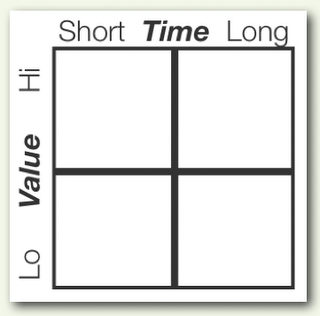I Just Never Get Around To It . . .
Why It's Important
It’s a fact that being busy is just a part of life. But I’ll bet that your day is also just full of annoying trivialities that don’t add value, when seen through your customers’ eyes.
Things like . . .
Too often, high-value activities end up sidelined. This is especially true when those activities are things we’re not comfortable with. The result is that we tend to feel guilty (because after all, you know what you should be doing), AND our performance as an individual / manager / leader is less than it could be.
So to perform to your potential you need to stop being so [darned] busy with trivialities, and focus on the things that matter.
Do this, and you’ll be astonished at the difference in what you, your team, and your organisation can achieve. And that’s got to be worth considering!
Seven Tips
1. Just Where Does All The Time Go?
What Next
This edition of TeamTips is concerned with the performance-management side of Team Leadership. There are three things you can do if you’re interested in finding out more about this:
1. Read A Book
Finally . . . You can also download this personal & team effectiveness article in PDF format, and a podcast to accompany it will be available next Tuesday, 8th August.
It’s a fact that being busy is just a part of life. But I’ll bet that your day is also just full of annoying trivialities that don’t add value, when seen through your customers’ eyes.
Things like . . .
- Creating reports that no-one understands or reads.
- Staffing issues - dealing with people who don’t arrive,
- Vague meetings - without a clear purpose or agenda.
- Interdepartmental ‘stuff’ - having to play the political game within your organisation
- Walking - would a ‘shoe leather allowance’ make a big difference to your pay?!
Too often, high-value activities end up sidelined. This is especially true when those activities are things we’re not comfortable with. The result is that we tend to feel guilty (because after all, you know what you should be doing), AND our performance as an individual / manager / leader is less than it could be.
So to perform to your potential you need to stop being so [darned] busy with trivialities, and focus on the things that matter.
Do this, and you’ll be astonished at the difference in what you, your team, and your organisation can achieve. And that’s got to be worth considering!
Seven Tips
1. Just Where Does All The Time Go?

Draw a 2x2 grid on a piece of flipchart paper. Label the vertical axis “Lo/Hi Value”, and the horizontal “Short/Long Time”. Stick it up, and over a couple of weeks, record your activities on it using Post-It™ notes. Get the rest of your team involved by posting their activities too.2. Analyse
Get together and discuss the activities that you’ve all posted. Remember ‘Value’ is a subjective term, so you may have some interesting differences in opinion.3. Act: Low Value
For Long Activities, find ways to just stop doing these things! They take up lots of time, but for no real value. Short Activities are probably simple tasks that are below your ‘level’. How can you delegate or outsource these?4. Act: High Value
Where you want to be is creating high value in small time packets. The more of your activities you have here, the better you’re performing. For Long Activities, systemise the work, to achieve the same result in less time.5. BUT . . . What's Missing?
Analysing what you DO is great, but what AREN’T you doing? Brainstorm the high-value activities that always seem to get put off.6. What Get's Scheduled Is What Gets Done
Put those missing activities into your diary. Treat them as FIRM appointments, not to be deleted or re-scheduled7. Stand Up And Be Counted
Involve others in those missing activities. Make promises, go public, and do everything you can to be held to account for them. This way, you’re far more likely to stick to your intentions to do them.
What Next
This edition of TeamTips is concerned with the performance-management side of Team Leadership. There are three things you can do if you’re interested in finding out more about this:
1. Read A Book
We recommend “Eat That Frog”, by Brian Tracy - all about how to find the time for those activities you avoid.2. Find Out More About The 'Time Grid'
I’m indebted to Vicky at Accelerate for this great technique. It’s just one of the tools from the Lean Practice programme that we run jointly with her company. You can find out more about this by visiting www.leanpractice.co.uk.3. Call Sevenrings
We’ve helped dozens of individuals and organisations improve their teams’ performance, and we’d be happy to talk to you about your particular situation at no initial charge.
We specialise in helping people to get better results by changing the way they work. We can provide training from 1/2 day taster sessions focusing on just one aspect of the Team leader’s role, up to comprehensive programmes over several months.
So for an initial no-fee conversation about what you're trying to achieve, call us now. Our phone number is 0191 2522 335.
Finally . . . You can also download this personal & team effectiveness article in PDF format, and a podcast to accompany it will be available next Tuesday, 8th August.


0 Comments:
Post a Comment
<< Home